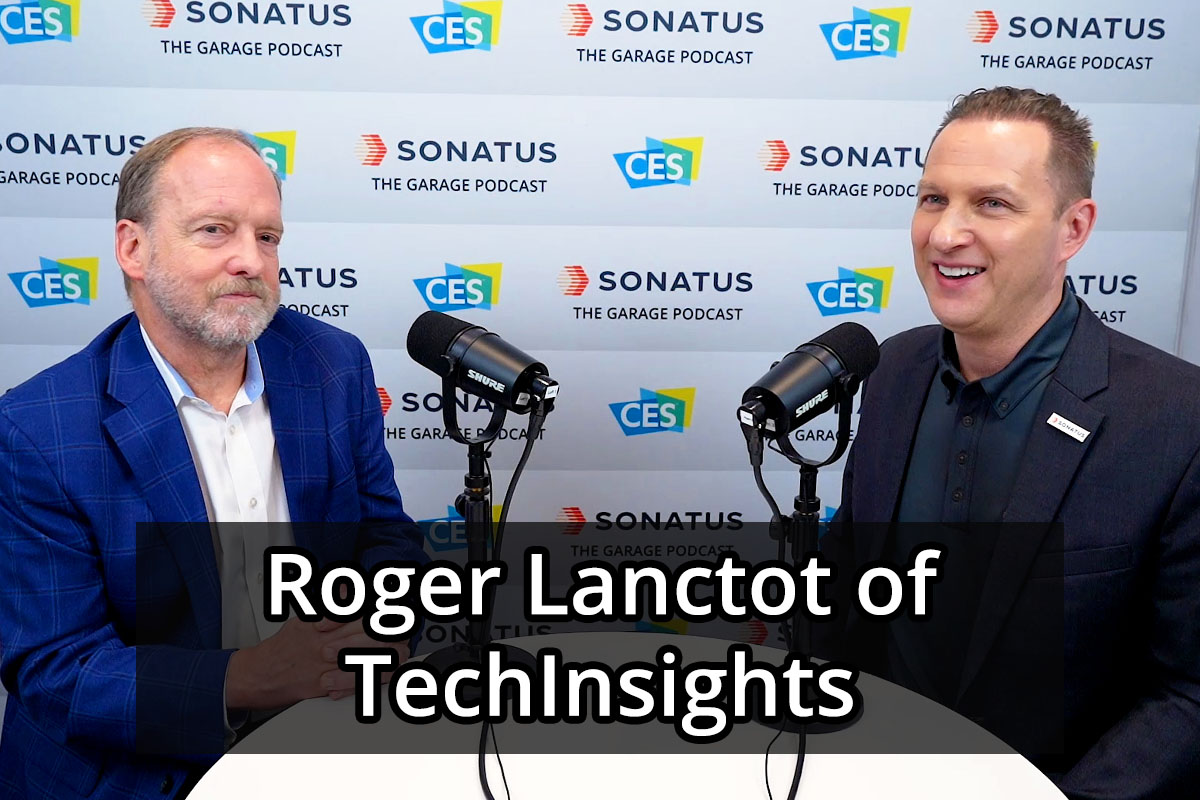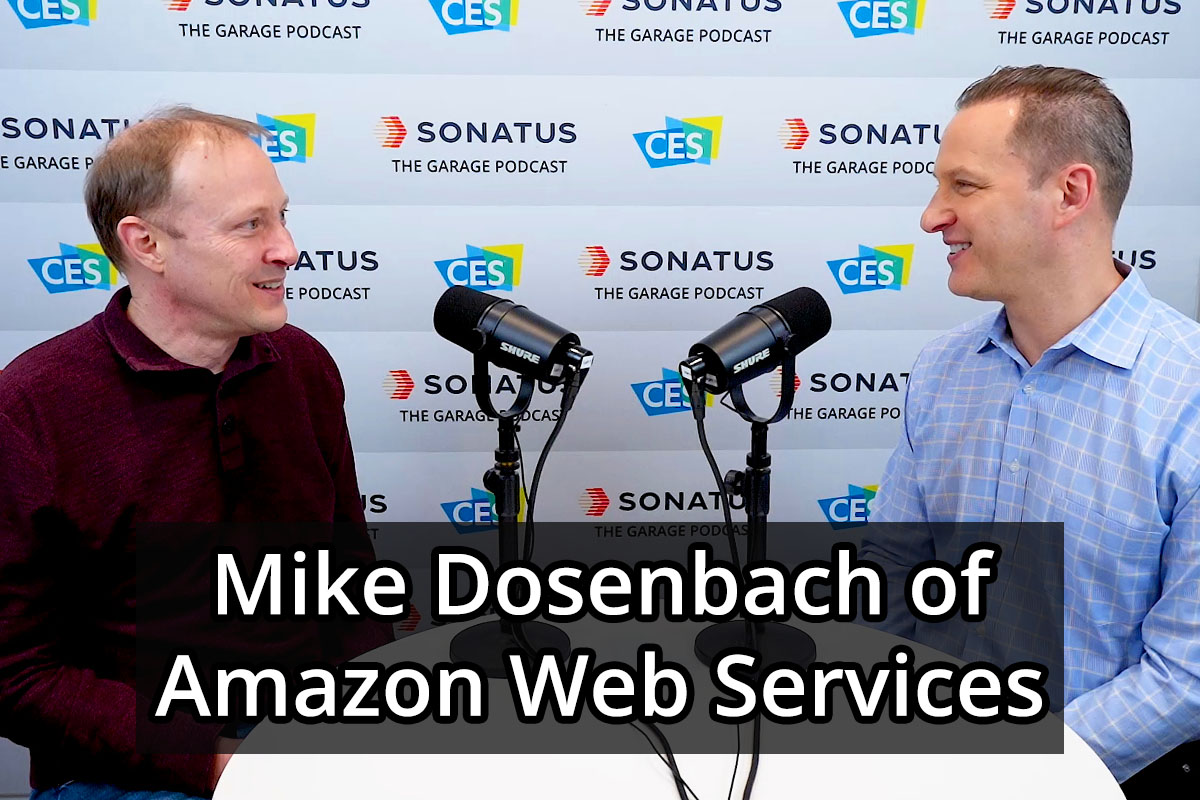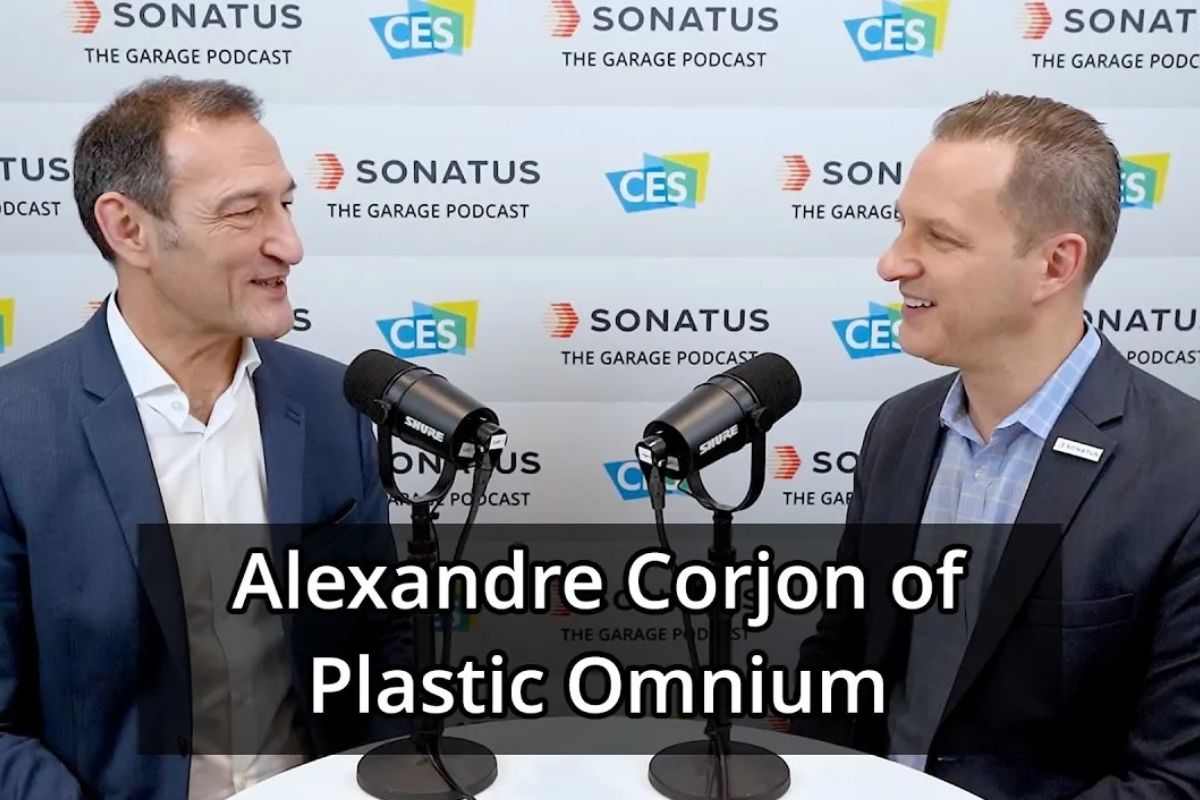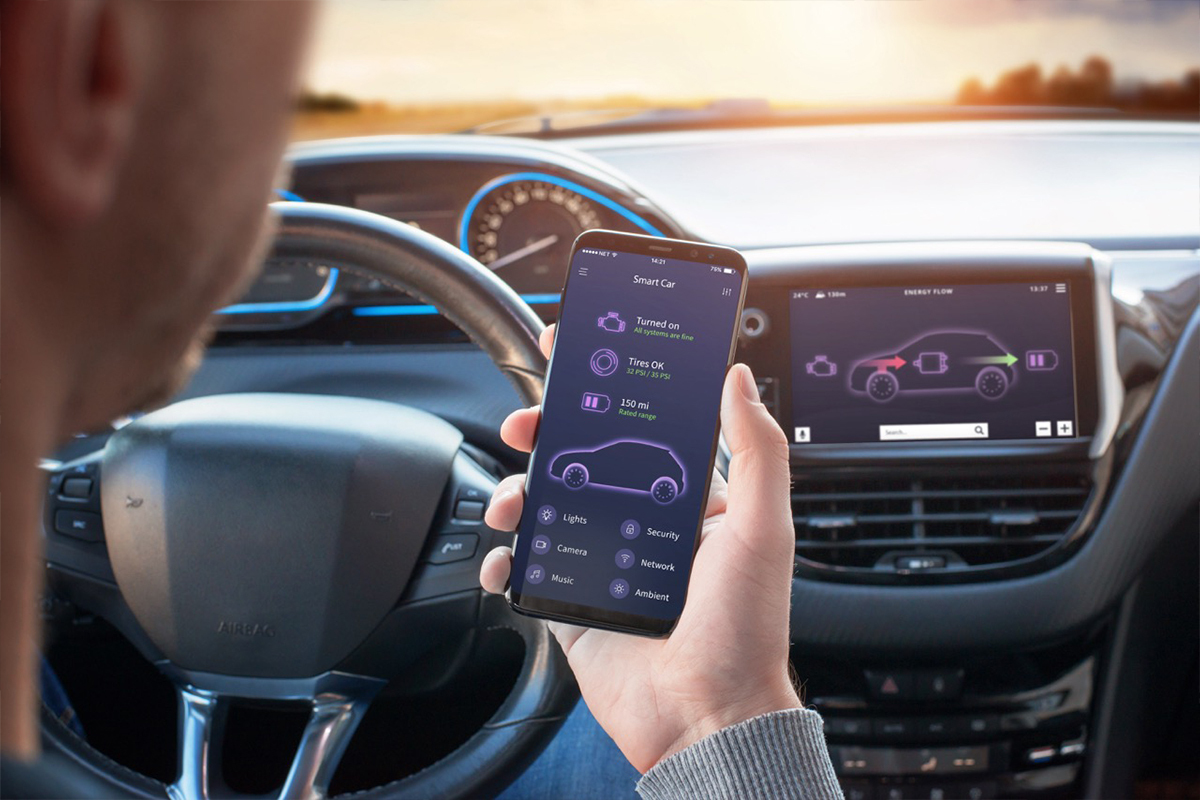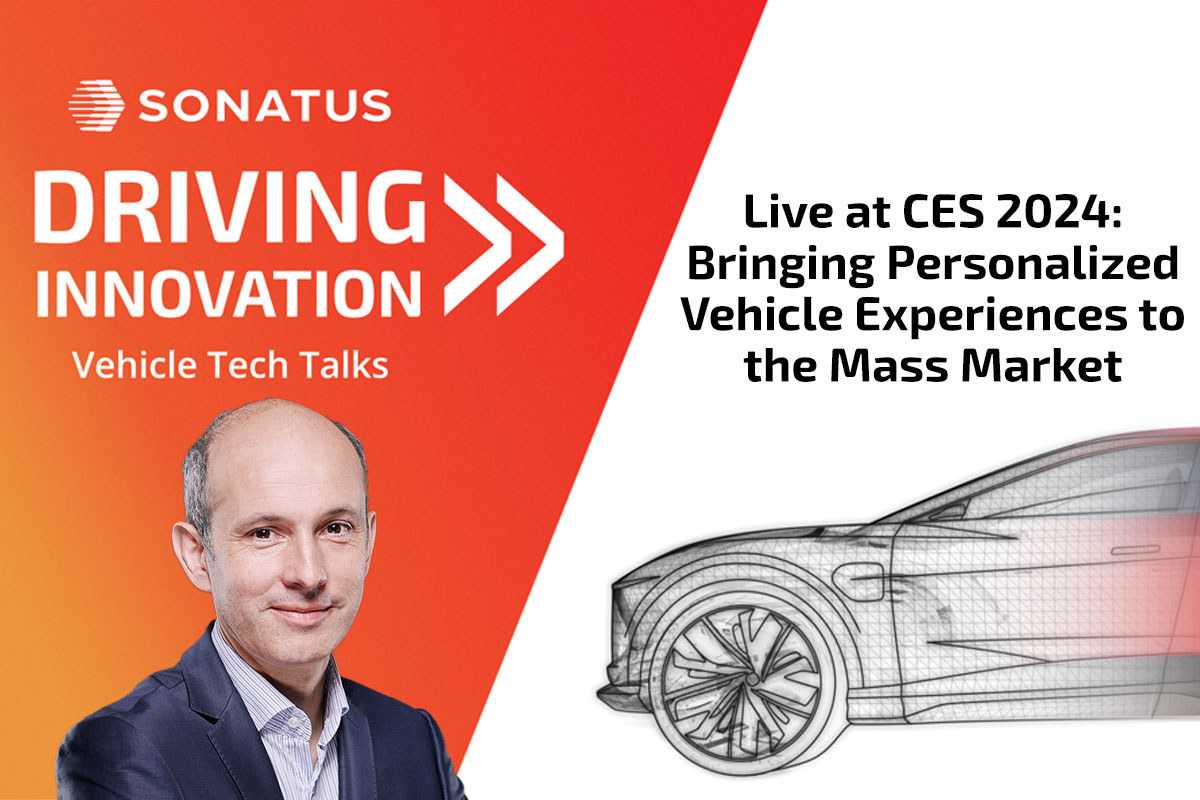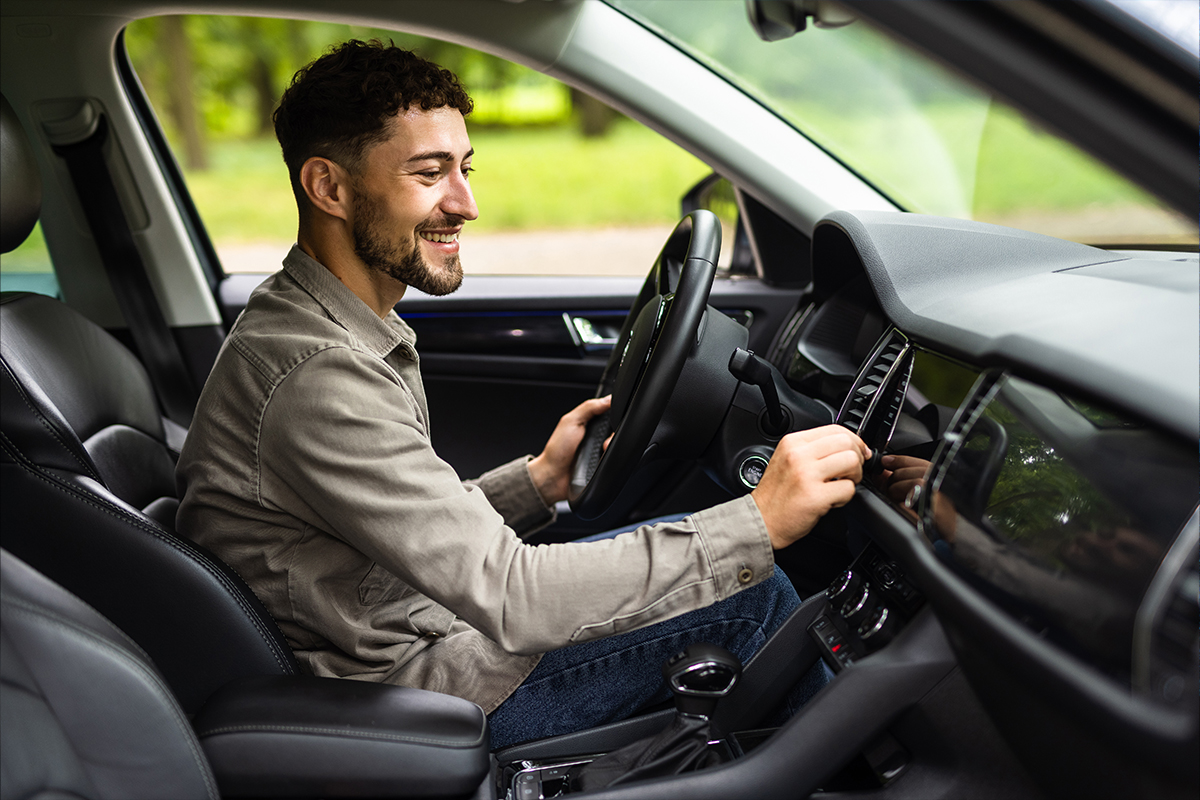Overview
JOHN: Today in The Garage, we speak live from CES 2024 with Marelli. Let’s go. Hello and welcome to The Garage. This is another episode filmed live at the Consumer Electronics Show 2024 in Las Vegas. We’re pleased to be joined today by Chiara Delporto, VP of Advanced Sales for Marelli. Chiara, welcome to The Garage.
Meet Chiara Delporto
CHIARA: Thank you, John. Much pleasure. Thanks for having me.
JOHN: Nice to see you. And tell us a little bit about you and about your role at Marelli.
CHIARA: Yeah, for sure. As you mention, I’m VP of Advance Sales, my biggest focus is software-defined vehicle. I’ve been at Marelli for about six months, but I have 20 years of automotive experience.
JOHN: That’s fantastic. Actually, you’ve been with many different car companies. You got to tell us a few of the many you’ve been at before.
CHIARA: Well, I guess the most exciting one was Ferrari at the beginning, that was a- A little exciting. Very exciting, very shiny. And nine years of that. And then after that, I took an exciting trip to Detroit and joined Harman, where I worked on a lot of the software-defined vehicle functionalities there. So infotainment and audio. And then I was at Cubic Telecom for some time learning about software and connectivity. And now at Marelli we focus on this next exciting generation of software-defined vehicles.
JOHN: That’s great. And I always ask our guests to tell us something interesting about themselves, some fun fact about you.
CHIARA: Absolutely. And actually, this came up very recently over Christmas. I am a big traveler, but I beat my record and I actually traveled over four continents in six weeks.
JOHN: That’s incredible. That’s a lot of travel.
CHIARA: It is. A lot of time zones, a lot of jetlag, but really, really exciting. I’ve traveled all over the world. I love to travel as well. My wife does, as well. And I think one of the most interesting places I’ve been to is Malaysia. I went to a trip to Singapore and we also went up into Malaysia, had a beautiful beach vacation there some years ago, and such nice people in that part of the world. That was really enjoyable.
Oh, I’m sure. That’s in my to-do list.
Marelli’s role in SDV
JOHN: So in The Garage Podcast, and in Sonatus, we focus on advanced vehicle software technologies and software-defined vehicles. I’d love to hear your perspective on SDV, and where do you think the industry is at and going now?
CHIARA: So software-defined vehicle is very exciting because now software has evolved and it is becoming the driver of actually designing the entire car. So that means that it’s not only more flexible to design, but it’s also faster and more affordable to bring into production, which is a great advantage for automakers that are looking for that right now.
JOHN: That’s great. That’s great.
CHIARA: Yeah. So at Marelli, I mean, we’ve existed in the business for over 100 years. Across all of these domains that most people know. So not only electronics and software, but also lighting, suspension, transmission. So SDV is a great opportunity for us to bring all of those domains together across the spaces of hardware, software, and cloud and enable that approach of designing the vehicles to the automaker. And that’s what needs to be done in this generation.
Increased OEM focus on software
JOHN: That’s great. I mean, yeah, there’s such an increased focus from OEMs on software now. They have a lot more interest in being aware of the software in their vehicles than before, I think. So much so I think you’re seeing this shift between, you know, OEMs wanting to do everything themselves and wanting to do outsourcing in kind of a pendulum that goes back and forth between the two sides over many generations, right? Where do you see the pendulum now as far as OEMs and their interest in doing software themselves versus working with companies like you or companies like ours?
CHIARA: Oh, definitely. So the evolution of technology made it so that companies have to evolve as well, and that applies to OEM as well. As you said, we’ve seen pretty much all the OEMs building their software companies inside the companies that are various notorius examples in the industry. So hiring thousands of engineers and adapting their skill set. And the thing is that at Marelli, we don’t want to overcome that. We actually appreciate that because it makes us evolve as well.
JOHN: Right.
CHIARA: So the pendulum is that now OEMs want to own more software, also own more hardware and integration in some ways. So the way for us to cooperate with the OEMs is called co-creation, we call it “co-creation at speed” , which means we are no longer the ones that come to a partner and say, this is our stuff, take it. Right? That doesn’t work anymore. So we basically have multiple sessions with our customer prospect partners and we look at the user experience, which is the basis of everything we want to do. Then what is the software needed to implement that user experience and therefore what is the hardware needed? So what the architecture looks like, in essence, the core platform, the zone platform. Do you want a lean, a pro, or an elite version until we achieve the desired result. So if they want to own a piece of software or a piece of hardware, it’s absolutely fine. We’re there to…meet them where they are, and to fill in the gaps if they have any need.
JOHN: It’s interesting, you talked about user experience. So first thing, it sounds like you’re starting with the end in mind…“begin with the end in mind” is a famous saying. And that’s important. But you’re also not prescribing a specific hardware. Here’s the hardware. Now what can I do with it? You’re saying actually, here’s the result I want to get. What’s the best way to achieve that? Best way software. Best way hardware. I think that’s a very smart way to go.
Start with the software not the hardware
CHIARA: Yes. That’s exactly the difference, right? So in the previous generation of cars, you would start from a hardware and then you will see what the hardware can do. And then you would design your user experience based on that. Now it’s the complete opposite. You start from the end result. You need to start from what the end user wants right in the car. The personalization which we will talk about. And then from that you define the software. You define the software, you define the rest of the architecture. So it is really exciting. And the big advantage of doing that is that you can personalize your experience a lot faster, a lot easier, OTA is existing a long time. But now there are other technologies like digital twin. Let’s not forget the cloud. So now the entire car is replicated in the cloud. So a car maker can make changes, add additional functions, and they can push them in the car faster, a lot more easy. So that’s taking…that’s accelerating very quickly. And at Marelli we are trying to stay, you know, on this wave and it’s very exciting.
Joint demo with Marelli and Sonatus
JOHN: You mentioned personalization and we’d be remiss if we didn’t talk about our collaboration partially that brings us together today because viewers may know if you had a chance to come to see us, that we’re showing off a joint demonstration between Sonatus and Marelli here at the booth…both of our booths. How we can enable next-generation vehicle personalization. So I’m going to give you the slightest picture of it, and then we’ll put a little picture in the episode for you to see as a viewer. The idea is vehicle personalization today tends to be limited to high-end vehicles and how can we together expose that to a wider range of vehicles and not only that, but make it much more powerful so that we can almost provide a kind of an app store kind of experience to drivers so they can really have a compelling experience in their vehicles. And so it’s been a great collaboration with you. We’re showing it at our booth and you’ve got some kind of mini cars in your booth that you’re showing it as well. And so we’re so excited to work with you. How has the reception been to that?
CHIARA: Well, first of all, Personalization is always something that is coming across very easily because, I mean, very simply, there are many different people that drive the same car. A lot of these different people want to see things that are related to themselves, right? So people that came in our booth had the opportunity to do that, you know? So to make certain selections of their favorite passions, their favorite colors even, what they are caring about and then see them all implemented in the car real-time. That’s thanks to the software-defined vehicle. So the digital twin, the cloud enables that and all of this technology.
JOHN: Yeah, that’s fantastic. We just announced in December our vehicle personalization solution and it was a kind of a product we developed. But you were a collaboration partner to help us show this off. So it’s been a fantastic experience and we’re really grateful for that.
The importance of the cloud
JOHN: You mentioned the Cloud. AWS is also a partner and part of this cloud where, you know, we’re storing settings in the cloud. And you know, we share a friend in common. Stefano Marzani is a good friend of both of ours, and we were so pleased. The other day he won a Motor Trend SDV Innovator Award, as did executives at Sonatus. So we were so pleased almost to win on the same day as him. But also a good friend. I was just visiting with him a few weeks ago and we were talking about how you were going to visit on the podcast. He was so excited to hear.
CHIARA: Oh yeah, Stefano and I go back 15 years. I was very, very excited for him, for the win, and for you guys as well. I mean, talent is coming up very, very quickly. It’s great to see that. You’re right, AWS is another big partner of ours. We actually had Wendy Bauer doing a media event with our CEO and talking about software-defined vehicle and how do we enable all of the things that we discussed. So in particular the cloud part, where they are very strong. And therefore it’s really great to see all of this coming together.
Machine learning and AI
JOHN: Fantastic. Where do you see the role of machine learning and artificial intelligence? It seems like it’s growing across the space. Is that something you guys are looking at?
CHIARA: Oh, very much so. We actually had a dedicated demo in our booth with a context-aware user experience that are driven by AI. So the car becomes smarter and smarter based on what’s happening in the surroundings, or actually even inside the vehicle is able to make smarter decisions thanks to AI. That’s from a product perspective. But AI, as you know very well, is also improving a lot of our processes, the way we write code not only in the car but also in the cloud. So Marelli is working with multiple partners that are the best in class in the industry because, I mean, the world is going very, very fast. The people are – carmakers – want to develop features much faster. They are launching in 12 months, which is incredible. So AI is enabling a lot of that speed. So this is definitely something that is no longer the future. It is right now. We just have to embrace it, ride it, and make it, you know, become more relevant.
JOHN: Yeah, and you mentioned from the very beginning software-defined vehicles. And one of the things that I think is so critical is the plasticity. The ability to change the behavior. And it’s not just about OTA updates. Yeah, that’s important. But it’s about fundamentally having the infrastructure that allows it to evolve over time because we’re constantly learning new things. Even a few months ago AI has changed so much. Machine learning has changed so much. So we have to have the kind of infrastructure in vehicles to allow us to take advantage of these innovations as they continue to evolve. So that’s, I think, another promise of software-defined vehicles as well, is to almost future-proof for, you know, this rapid evolution of these technologies, I think.
CHIARA: Absolutely. So the big advantage of it is now you can design…so the hardware drives a lot of the cost of your car. Now you can design hardware that lasts longer because through the software updates, through the AI, through the digital twin, you allow personalization and changes in a lot easier way, faster, more seamlessly. So that’s very important. And I mean, who knows what will come after that. I mean, things will go even faster. So I think we are in the middle of the biggest disruption in automotive. There are so many solutions that come up and so much innovation. And this is a space where it’s really a blast to be in it right now.
Marelli’s focus for the future
JOHN: So looking to the future, where are you focusing and what’s coming up from Marelli in the future?
CHIARA: So when it comes to the software-defined vehicle architecture, the messaging that we have in our booth, is about mostly two things. One is standardization. The other one is sustainability. Standardization is hugely important because it’s the key to affordability, because if you design a solution in many, many different ways, that’s not cost-effective. So once all of these solutions are more prominent in the market, there will be a way to standardize a lot of it. For example, the zone platforms or the core platform. And the more they are standardized, the more they are affordable. So that’s key for the automaker to make the right decision and for the vehicle to be most affordable for the end users.
JOHN: And it provides reuse. I think standardized…sometimes people say standardized is a dirty word, but what you mean is reusable. So you don’t have to reinvent everything every time.
CHIARA: A lot of that. But also, you know, if you have- it’s also about scalability. So most of the automakers have different brands. They have different car lines, They have different segments. So they want to be able to not design an architecture for each and every one. They want to be able to, you know, keep the same as much as possible. So to design something that is scalable. So with the minimum changes. Hopefully through software.
JOHN: Different price points, different performance points, different feature sets, but on the same foundation.
CHIARA: On this same foundation. So they don’t have to reinvent every time the same things, spend a lot of time, resources, and money. So that allows us to cover all of their needs at the same time. Yeah. And another piece of it, you touched on, AI. I think AI as we said is very important, both from the product and an operational perspective. We think that that is going to become even more prominent as we go forward. We see it in the consumer world. We see all of the ChatGPT’s of this world that are driving, you know, many things, good or bad, we don’t know. But in particular, on the good side of things, let’s say, AI is going to enable a lot more solutions than in the past that were not possible without it. So we’re going to be very focused on enhancing that.
JOHN: That’s great. Yeah, we’re focusing in the same way. I mean, machine learning and artificial intelligence is going to be critical to our products. And we’re investing very heavily to make sure that we avail ourselves of that in many different ways.
CHIARA: That’s right. Absolutely.
Sustainability in automotive
JOHN: You mentioned also sustainability. I know that’s an important focus for many companies.
CHIARA: Yeah, absolutely. So Marelli has actually a strong foundation on sustainability. For example, our interior solutions are all made out of sustainable materials right now, so you can develop the interiors of your car with all these sustainable type of trims and all of that, which is very exciting. But not only that, I mean, we all know that carbon-neutral is very important also for this world, for the planet. So we are implementing a lot of processes for the carbon-neutral path. We are doing that not only in our processes but on our product as well. So we’re looking at materials, we’re looking at heat dissipation, we are looking at our vendors and all of our supply chains and all of these things, because that’s one of the foundations that is non-trivial, but it’s also a must. Always something that we have to achieve.
Conclusion
JOHN: That’s great. Well, look, this has been a fantastic conversation. I’m so grateful for you to come and spend some time with us. I know how busy you are at the show, so thank you for taking some time out. And thanks again for your collaboration on the demonstration and the work together.
CHIARA: Oh, thank you. I was thrilled to be there. Thanks for the opportunity. And to the next one.
JOHN: Very good.
CHIARA: Thank you.
JOHN: If you enjoyed this episode, please like and subscribe so you can see more content. Look forward to more episodes live from the Consumer Electronics Show 2024 as well as episodes from our studio in season two. We look forward to seeing you again very soon.
